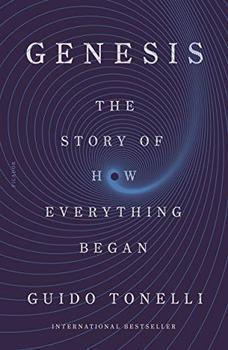Summary | Excerpt | Reviews | Beyond the Book | Readalikes | Genres & Themes | Author Bio

Critics' Opinion:
Readers' Opinion:
First Published:
Apr 2021, 240 pages
Paperback:
Apr 2022, 240 pages
 Book Reviewed by:
Book Reviewed by:
Will Heath
Buy This Book
Introduction: The Grand Narrative of Origins
Forty thousand years ago, when the second wave of Homo sapiens arrived from Africa, many areas of Europe were already populated by Neanderthals. Organised into small clans, they lived in caves that today provide unequivocal proof of a complex symbolic universe: walls painted with symbols and drawings of animals, bodies buried in foetal positions, bones and large stalactites arranged in ritual circles; plentiful evidence, in other words, of a culture that had in all probability also developed a sophisticated spoken language.
It is possible, then, to imagine hearing a story of the origins of the world already resounding in those caves, the elders transmitting it to the young through the power of words and the magic of memory: the echo of an ancient narrative. It would be thousands of generations before Hesiod (or whoever we know by that name) left us, in his Theogony, a written account of how our universe came into being, woven from poetry and cosmology.
This ancient origin story continues to evolve to this day, thanks now to the language of science. Equations might lack the evocative power of poetry, but the concepts of modern cosmology – a universe that was born from a fluctuation in the quantum void, or from cosmic inflation – can still take our breath away.
All such stories spring from one simple, inescapable question: 'Where does all this come from?'
It's a question that still resonates in every part of the world, among people belonging to vastly different cultures. It's a point of commonality in otherwise distant civilisations; a question posed alike by children and executives, scientists and shamans, astronauts and those small, isolated populations of hunter-gatherers who survive in areas of Borneo, Africa and the Amazon. A question so primal that some have even imagined it must have been handed down to us by the species that came before.
Foundation Myths and Science
For the Kuba of the Congo, the universe was created by the great Mbombo, the lord of a dark world who vomited up the Sun, Moon and stars in order to free himself from a terrible stomach ache. According to the Fulani of the African Sahel, it was the hero Doondari who transformed an enormous drop of milk into earth, water, iron and fire. For the Pygmies of the forests of equatorial Africa, everything came into being when a huge turtle laid its eggs while swimming in the primordial water.
At the origin of mythological narratives of this kind, there always seems to be something indistinct that most troubles us: chaos, darkness, a liquid and formless expanse, a tremendous fog, a desolate Earth – until a supernatural being intervenes to shape things and bring order. This is where the great reptile comes in, the primeval egg, the hero or the creator who separates the heavens from the Earth, the Sun from the Moon, and gives life to animals and men.
The creation of order is necessary because it establishes the rules, providing the foundations of rhythms that mark the life of communities: the cycles of day and night, the changing seasons. Primitive chaos triggers an ancestral fear: the terror of falling prey to the forces unleashed by nature – from ferocious beasts and earthquakes to droughts and floods. But once nature is induced to follow the rules dictated by the hero who has brought order to the world, humankind is able to survive and reproduce. The natural order is reflected in the social one, in the combination of norms and taboos that define what is allowed and what is strictly forbidden. If the tribe behaves according to the rules established by that originary pact, then this stockade of rules will protect the community and prevent its disintegration.
From such myths as this, other constructions follow. They morph into religion and philosophy, art and science – disciplines that will hybridise and fertilise each other, and allow enduring civilisations to flower. Yet their interweaving breaks down when science starts to develop out of all proportion to our other speculative activities. From that moment on, the sleepy rhythm of societies, unchanged for centuries, is ruptured by a succession of discoveries that will profoundly alter the existence of untold populations. Suddenly everything changes, and continues to change, at a vertiginous pace.
Copyright © 2019 by Giangiacomo Feltrinelli Editore, Milano
Translation copyright © 2021 by Simon Carnell and Erica Segre





The House on Biscayne Bay
by Chanel Cleeton
As death stalks a gothic mansion in Miami, the lives of two women intertwine as the past and present collide.

The Flower Sisters
by Michelle Collins Anderson
From the new Fannie Flagg of the Ozarks, a richly-woven story of family, forgiveness, and reinvention.

The Funeral Cryer by Wenyan Lu
Debut novelist Wenyan Lu brings us this witty yet profound story about one woman's midlife reawakening in contemporary rural China.
Your guide toexceptional books
BookBrowse seeks out and recommends the best in contemporary fiction and nonfiction—books that not only engage and entertain but also deepen our understanding of ourselves and the world around us.